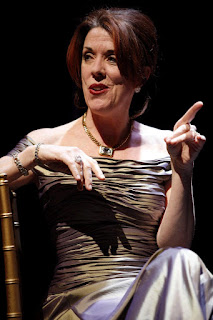 In case you've missed it, SpeakEasy's current production of The Little Dog Laughed marks its debut in the "big leagues" of Boston theatre - to be specific, the Wimberley Theatre at the BCA, a 350-seat-or-so spanking new wonder, and probably the best place in town to see a show.
In case you've missed it, SpeakEasy's current production of The Little Dog Laughed marks its debut in the "big leagues" of Boston theatre - to be specific, the Wimberley Theatre at the BCA, a 350-seat-or-so spanking new wonder, and probably the best place in town to see a show. And said show is suitably crisp and clever (Little Dog is Douglas Carter Beane's witty exposé of the Hollywood closet) and neatly matched to the "slightly-edgy" desires of its audience. In a nice double whammy, the production also marks the big-league debut of Maureen Keiller (at left), one of the funniest ladies in town, who's been toiling in Boston's small theatre trenches for years, and is riding a wave of local good feeling.
So what's not to like? Well . . . a few things, actually, but I know I'll sound like a cad for bringing them up (for the record, again, my own show is playing just down the street, and has been loudly razzed by most of the folks praising Little Dog, so go ahead and take the following as sour grapes if you like).
But first the good news - Keiller is indeed to die for as the closeted-lesbian-power-agent Diane, whether she's vamping down the red carpet in steel-gray couture or texting a vicious coup de grâce over her cell. She's not as brightly ferocious as Julie White was on Broadway, but is instead sarcastically soignée, threading little veins of loneliness and despair through her poised bitchery, and thereby hanging by her gleaming nails onto a larger share of audience sympathy than you might suppose - indeed, more sympathy than her supposed victims (a closeted Hollywood actor and his hustler crush) ever manage to claim.
This isn't so shocking, given that Keiller's got almost all the best lines - indeed, to be honest, while The Little Dog Laughed is great fun, it's really only half a play - and Keiller's got that half, which is actually a spiel of brilliant, brittle monologues (which many, I admit, may feel make a pretty good evening all on their own). As if to underline this one-half-really-sings/the-other-really-doesn't structure, designer Eric Levenson has bisected his richly minimal set with a stretch of red carpet - and basically, the play's women battle over the plum lines on one side, while the men weakly wrestle with their limp wrists on the other.
For perhaps the real surprise of The Little Dog Laughed is that someone's nipping at Keiller's stilettos - that being Angie Jepson, who did strong work in Theatreworks' Midsummer last season, but has never hinted at the crackling energy she displays here. As Ellen, the down-on-her-luck party girl for whom the party seems about to be over, Jepson nails such Gen-Y bon mots as "I wouldn't recognize one of my emotions in a police line-up," mining them expertly for both their spoiled zing and their undertow of rue. Whenever Jepson's onstage, this show seems to be hers. What's more incredible is that she actually manages to make her role (half-besotted, half-not, with a bisexual rentboy) emotionally credible (which it's at least half-not).

Jonathan Orsini and Angie Jepson party on in The Little Dog Laughed.
Alas, the masculine half of Little Dog Laughed isn't nearly in the same league as these twisted sisters - although to be fair, neither is their material. Beane has whipped up a clever soufflé from several tabloid stories - basically, he combines John Travolta's hustler trouble with tales of Tom Cruise's former manager, and then mixes both with his own fight to get his play As Bees in Honey Drown onto the big screen. The playwright seems to think he's thus conjured a scenario in which we can believe a 'bi-curious' hustler might succumb to romance with a leading man, who then struggles to strike a blow for gay rights in La-La-Land - but actually, Beane dodges both these challenges. True, he's got the sitcom chops to keep his scenes moving, even if they never coalesce, but as the show progresses, and the power players begin their "parlor games for mean people," less and less, oddly enough, seems to be at stake. During the show's final "twist," we only end up admiring Diane's ingenuity as she remorselessly reconfigures a sexual pretzel into a happy heterosexual couple - because after all, did we really give any of these relationships an ice-cube's chance in Hollywood?
But even given the gaps in Beane's script, it has to be said that director Paul Melone has miscast actor Robert Serrell in the central role of Mitchell, the actor who's "like the guy next door, if the guy next door were dashing." Serrell comes off as a bemusedly ironic character actor - certainly intriguing in plenty of other roles, but emitting nary an ounce of "dash," and rarely connecting in a convincing way with Mitchell's inner conflict. Meanwhile, as his boy-toy-cum-love-object (sorry), Jonathan Orsini does a bit better, but sometimes coasts on his sexy inscrutability, and doesn't really scale his performance to the size of the Wimberley. Perhaps what hampers both is that they seem very not-gay throughout, as well as very not-happy about the glimpses of nudity and nestling the script demands. Who'd have thought The Little Dog Laughed would turn out to be about straight guys pretending to be gay? Somewhere, Tom Cruise and John Travolta's agents are laughing along with that little dog.
No comments:
Post a Comment